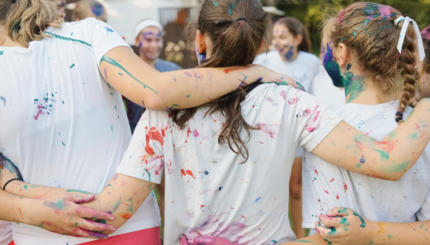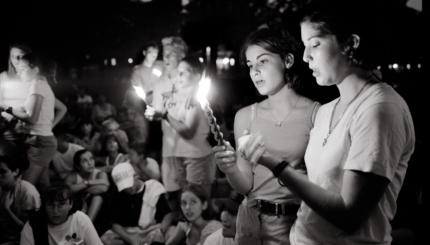Is it really all pray, no play at Ramah camps across the country?
This was the question posed by a Forward article this week. The piece, looking particularly at Ramah Berkshires, wonders if praying three times a day as well as having Judaic studies decreases the amount of “fun” that goes on at the summer camps.
It would have been hard for me not to address this article. I was not fortunate enough to attend a Ramah growing up, but have since staffed at two of the camps. Nearly all of my friends have both staffed and attended a Ramah.
The clear answer to the above question is NO.
The author of the piece begins with the following question:
At Camp Ramah in the Berkshires, Jewish campers wake up every morning at 7:30 and daven the morning prayers. After some swimming or maybe a Frisbee game, the older kids can, if they want, daven again in the afternoon. And at the end of a day that includes a 45-minute Judaic learning session, well, they can… daven again.
Sound like a fun-filled, carefree summer camp experience? (MORE)
This is gross misrepresentation of the experience at Ramah. Yes, most of the campers will daven three times a day, as well as have Judaic studies. But what about the many hours of sports, theater, camping, trips, singing, dancing, and boating. What about the life-long friendships and memories forged during these summers.
What is so amazing about Ramah is that most of the Judaica is seamlessly weaved into the daily schedule. Prayer is not seen as a burden, but as an opportunity. Most of the camps use creative approaches to services, bringing in rabbinical students and other professionals to transform what could be boring services into meaningful moments. It is because of this that many campers leave with a new appreciation for prayer.
As for Judaic studies, never in my life have I experienced such fun methods in learning. When working at Ramah Wisconsin, I taught two age groups what I called “Fun Jewish Stuff,” as opposed to yahadut (Judaica). One session used MTV’s The Real World as a basis for learning communal responsibility. Each student took on the persona of a Jewish teen from the around the world. They learned about global customs and practices. The message was clear “kol Yisrael aravim zeh lazeh,” all Jews are responsible for one another.
The other course used a scavenger hunt in the woods to find clues as to who sold Joseph into slavery, studying the famed Genesis story. As the campers found contradicting clues, they learned that the Torah cannot be read without a willingness to analyze and explore the text in greater detail.
Where else in the world can one play football using Hebrew words, do Israeli dance with hundreds of other kids, and daven overlooking a sunset radiating off of the lake?
If I could, I would spend every summer in such an environment that manages to foster fun as well as a love of Judaism.
Summer camp is unlike any other Jewish activity. Time and time again, professionals will tell you there is no better way to engaged children in Judaism.
As Rabbi Mitchell Cohen, director of the National Ramah Commission said in the article:
Day schools do a phenomenal job of education, but it’s school, it’s homework. It’s not a fair fight with summer camp, which for many kids is the best experience of their lives.
daven
Pronounced: DAH-vun, Origin: Yiddish, to pray, following the Jewish liturgy.
Torah
Pronunced: TORE-uh, Origin: Hebrew, the Five Books of Moses.


